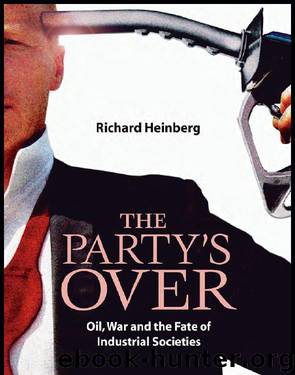The Party's Over: Oil, War and the Fate of Industrial Societies by Richard Heinberg

Author:Richard Heinberg [Heinberg, Richard]
Language: eng
Format: epub
Tags: History, Nature, Environmental Conservation & Protection, United States, Political Science, Social Science, Political Freedom & Security, Public Policy, 20th Century, Economic Policy, Sociology, Petroleum Industry and Trade, Petroleum Reserves - Political Aspects, Petroleum Industry and Trade - Political Aspects, TEC052000, International Security, Petroleum Reserves, Petroleum Industry and Trade Political Aspects, Petroleum Reserves Political Aspects, Renewable Energy Sources, Political Aspects
ISBN: 0865715297
Publisher: New Society Publishers
Published: 2003-01-02T00:00:00+00:00
Figure 19. US energy consumption by source (Source: US Energy Information Administration)
France and the UK, despite having pursued breeder programs for several decades, have no plans for constructing more such plants. Japan has not restarted its Monju reactor, which was shut down after a sodium fire in December 1995. Among countries that have constructed breeders, Russia alone supports further development.
It is also possible to reprocess spent fuel into a form known as MOX (mixed oxide), which consists of a mixture of plutonium and uranium oxides. Reprocessed MOX fuel can then be used to replace conventional uranium fuel in power plants. However, only two MOX plants have been built (one in the UK, the other in France), and both have turned out to be environmental and financial nightmares.10
Uranium — the usual fuel for conventional reactors — must be mined, and it exists in finite quantities. The US currently possesses enough uranium to fuel existing nuclear reactors for the next 40 years.11 The mining process is wasteful, polluting, and dangerous: the early New Mexico uranium mines, which employed mostly Navajo workers, ruined thousands of acres of Native lands and poisoned workers and their families. The entire episode constitutes a horrific and permanent blot on the industry’s record.12
Further, much of the energy needed to mine uranium currently comes from oil. As petroleum becomes more scarce and expensive, the mining process will likewise become more costly and will yield less net energy.
Clean? Vice President Dick Cheney told CNN on May 8, 2001, that nuclear power “doesn’t emit any carbon dioxide at all.”13 But this is true only in the sense that the nuclear chain reaction itself doesn’t create such emissions. Mining uranium ore, refining it, and concentrating it to make it fissionable are all highly polluting processes. If the whole fuel cycle is taken into account, nuclear power produces several times as much CO2 as renewable energy sources.
The assertion that nuclear waste is only produced in small quantities is misleading. Direct wastes include roughly 1,000 metric tons of high- and low-level waste per plant per year — hardly a trivial amount, given that much of this waste will pose hazards for thousands or tens of thousands of years to come. Further-more, this figure does not include uranium mill tailings, which are also radioactive and can amount to 100,000 metric tons per nuclear power plant per year.14
Can the problem of nuclear waste be solved by the creation of a permanent repository? To assume so is to indulge in wishful thinking. After nearly five decades of the development and use of atomic energy, no country in the world has yet succeeded in building a permanent high-level nuclear waste repository. Moreover, the transporting of wastes to such a central repository would create extra dangers.15
Practical? It is true that nuclear fuel has an extraordinarily high energy density, but this is the case only for uranium that has already been separated from tailings and been processed — which itself is a far more hazardous and energy-intensive procedure than drilling for oil or mining coal.
Download
This site does not store any files on its server. We only index and link to content provided by other sites. Please contact the content providers to delete copyright contents if any and email us, we'll remove relevant links or contents immediately.
| Anthropology | Archaeology |
| Philosophy | Politics & Government |
| Social Sciences | Sociology |
| Women's Studies |
The Secret History by Donna Tartt(19085)
The Social Justice Warrior Handbook by Lisa De Pasquale(12190)
Thirteen Reasons Why by Jay Asher(8907)
This Is How You Lose Her by Junot Diaz(6885)
Weapons of Math Destruction by Cathy O'Neil(6279)
Zero to One by Peter Thiel(5801)
Beartown by Fredrik Backman(5751)
The Myth of the Strong Leader by Archie Brown(5507)
The Fire Next Time by James Baldwin(5442)
How Democracies Die by Steven Levitsky & Daniel Ziblatt(5218)
Promise Me, Dad by Joe Biden(5153)
Stone's Rules by Roger Stone(5087)
A Higher Loyalty: Truth, Lies, and Leadership by James Comey(4960)
100 Deadly Skills by Clint Emerson(4924)
Rise and Kill First by Ronen Bergman(4788)
Secrecy World by Jake Bernstein(4752)
The David Icke Guide to the Global Conspiracy (and how to end it) by David Icke(4717)
The Farm by Tom Rob Smith(4507)
The Doomsday Machine by Daniel Ellsberg(4490)
